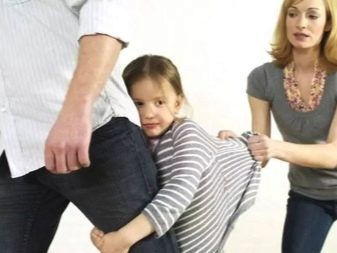The reasons for hatred of the father and how to solve the problem

None of us are perfect. Everyone has personal psycho-emotional problems and negative characteristics. People who have become parents are no exception. Mistakes in behavior with a child often lead to the emergence and strengthening of a feeling of resentment towards the father or mother in the minds of children or adolescents, often turning into hatred. And this is fraught with serious complexes and other emotional deviations already in adulthood. You should know why some people may hate their father for many years, and how to deal with it.
Main reasons
In such a close social group as a family, it is very difficult to hide your shortcomings, to contain negative reactions. Anyway, interaction between close people periodically exposes certain problems of the personality and character of each. The situation is even more aggravated and aggravated if someone has serious problems in the psycho-emotional sphere: irascibility, jealousy, resentment, alcoholism, excessive selfishness, an excessive sense of possessiveness, a thirst for manipulation, etc. Deficiencies and weaknesses will be clearly manifested in behavior, which cannot but affect other family members.
A huge section of science - family psychology - is devoted to the study and correction of disorders and problems in the relationship of close relatives. Recently, psychologists are increasingly analyzing the complex requests of already grown sons and daughters, who are gnawing at resentment and even hatred of their father.
Almost always, the basis for such a negative attitude is not laid in the current adulthood, but in childhood, adolescence, or early adolescence.

More often than not, there are certain reasons for a long-standing and ingrained resentment against dad.
- Overly authoritarian parenting style. The child is always under control, cannot show his individuality, crushed by many rules and requirements emanating from one or both parents.
- Alcohol addiction and, as a result, the immoral behavior of the father in the family and outside it. In such situations, the child often feels ashamed for his dad. The latter often gives rise to complexes and complicates socialization in childhood and adolescence.
- Hot temper, frequent conflicts and aggressive behavior of the parent strongly depress the child's psyche.
- Physical punishment, child abuse is often encountered today in apparently well-to-do and enlightened families. But such manifestations of paternal "love" leave the most indelible marks on the psyche of children, firmly engraved in the memory. This is one of the most acute and intractable problems in the field of family psychology.
- Dad leaving the family for the childbeing deprived of his constant attention is also a great trauma. Even with maintaining contact and periodic conflict-free communication, abandoned children often cannot forgive betrayal in relation to them and to their mother.
- It happens that a man behaves gently with his children., but acts aggressively and even cruelly with other family members. Observing scandals, swearing, beatings, the child gets by no means positive impressions, despite the fact that these conflicts may not concern him. Most often, grown-up sons experience strong hatred for the father for humiliating the mother.
- Childhood jealousy of brothers and sisters can be the cause of deep resentment. This is often observed in large families. Unfortunately, some parents really openly neglect one of the children, constantly setting him up as a favorite, pampering and praising the latter both in the family and in front of strangers. In addition to hatred and resentment, such childhood traumas are fraught with the formation of extremely low self-esteem, which leaves an indelible imprint on all areas of life.


Can a relationship be forged?
One of the commandments of psychologists and psychotherapists sounds like this: understanding and recognizing a problem is the first and most important step to solving it. In the case of negative emotions in relation to the father, this rule is also absolutely true. Hatred and anger are actually the first to "eat" the one who experiences them. Everyone probably remembers how exhausted and exhausted you feel after a serious outburst of anger. And if this feeling has been present for years, its action can be compared to a leech that sucks vitality from a person.
The problem is that many, despite their emotional fatigue and common sense, subconsciously still want to continue to hate. Someone believes that with an irreconcilable insult he will adequately take revenge on the parent, someone believes that sincere forgiveness is beneath his own dignity.
Therefore, it is very important to listen to yourself and understand what this evil feeling actually carries, whether it gives the fruits and results that you expect from it.

Psychologist's advice
Once you have a genuine intent to forgive, you can take the next steps toward breaking free of your long-held hatred of your father.
- Try to accept the fact that the past cannot be changed. As much as your dad wants to fix something, time cannot be turned back. Both you and your father are now completely different people, and the past years with their vicissitudes and hardships must be left behind.
- Perhaps, from the past childhood point of view, much seemed a little exaggerated. Try to scroll through the events in your head that are especially strongly and negatively engraved in your memory, looking at them already as an adult. It may very well be that some of the motives and reasons for the actions or behavior of the Pope will now be clearer to you.
- Don't hate out of spite. Sincerely accept the apology from your loved one. After all, you also need to make up your mind to ask for forgiveness.
- It is often a relief to have a sincere conversation with the one you are upset with. Only this should not take the form of a scandal with claims and accusations. Remember that your goal is to understand, forgive, and let go, not to hurt yourself in revenge.
- Tune in to the future and think less about the past. Any of our experiences is very important and useful if you treat it correctly. By their mistakes, parents present us with an anti-example.
But you should treat it as a life lesson. This will help you avoid negative behaviors in your own family.









